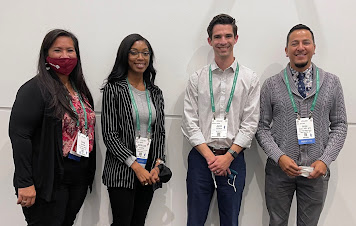 |
Jacob Williams, third from left, presented at the American Public Health Association's national meeting in Denver. He is shown with the session's moderator and fellow presenters. |
Jacob Williams, a third-year medical student at the USA College of Medicine, recently gave an oral presentation at the American Public Health Association's national annual conference in Denver. He discussed findings from a recent study examining public trust in sources of pandemic information and COVID-19 vaccine hesitancy.
“Vaccine hesitancy has been a hot topic lately with the development of COVID-19 vaccines, so I, and the rest of my great research team, wanted to see where people of Alabama were getting their pandemic information,” Williams said. “We wanted to see if trust in certain media sources would correlate with intention to receive the vaccine.”
In November 2020, 3,781 participants were recruited for the study through Facebook advertisements that linked to a 15-minute survey. Participants were Alabama residents over 18 years of age. The study was funded, in part, by the Immunization Division of the Alabama Department of Public Health. It was part of a larger data project by Casey Daniel, Ph.D. M.P.H., associate professor of family medicine and director of epidemiology and public health at USA Health.
Other members of the research team were Rachel Legg, Pharm.D., clinical pharmacist in family medicine; Chelsea Green, M.P.H., research coordinator at the Mitchell Cancer Institute; and Jesse Stutzman, M.P.H., a third-year medical student.
“Our goal with our abstract was to present information that could then lead to development of a strategy to increase public trust in sources of pandemic information, ultimately increasing vaccine uptake,” Williams said.
The study found that among those with no intent to vaccinate, 75 to 89 percent reported complete distrust of major news outlets and social media (Facebook and Twitter), with 42 to 48 percent reporting distrust of local health departments and the Center for Disease Control and Prevention. Among this same population, the only sources with a majority reporting “mostly or complete” trust were healthcare providers (50 percent) and then-President Donald Trump (51 percent).
“These high levels of distrust for major sources of pandemic information among individuals not intending to get the COVID-19 vaccine highlight the necessity of a multifaceted approach to distribute factual information,” the study concluded. “Public health strategies should take into account how personal biases against particular media may adversely affect the impact of educational approaches. Maintaining consistent vaccination messaging, grounded in science, across all information sources will minimize conflict between these sources and mitigate bias regarding COVID-19 vaccination as well as vaccination decisions for future public health crises.”
